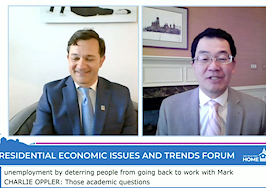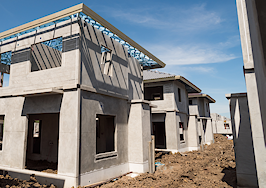Economists at Fannie Mae expect continued strong economic growth this year, but say the potential for inflation and rising interest rates are risks that should be monitored for their potential to slow momentum in the housing market next year.
Constraints on homebuilders are another concern, with a lack of listings already driving up home prices and denting sales. The good news is that for now, Fannie Mae forecasters see less pressure on interest rates than they did in April, although they still expect rates to climb modestly next year.
In their latest monthly forecast, economists with Fannie Mae’s Economic and Strategic Research Group project existing homes will sell at an annual pace of 5.88 million during April, May and June. That’s down from the previous forecast for second quarter sales to come in at 6.16 million, annualized. Sales of existing homes fell 3.7 percent in March, and recent data on pending sales and purchase loan applications suggest a forecast rebound in April sales is likely to be smaller than previously projected.
Sales of new and existing homes are still expected to grow by 6.3 percent in 2021, to 6.868 million, with construction of single-family homes growing by 24.8 percent despite constraints on supply including lumber, buildable lots, and labor. But next year, Fannie Mae expects home sales will fall by 5 percent, to 6.524 million units.
All in all, Fannie Mae projects the economy will grow at the remarkable pace of 7.0 percent in 2021, as the U.S. and much of the world relax restrictions put in place during the pandemic. That’s up from last month’s projection for 6.8 percent economic growth, with an improved outlook for consumer spending driving the change.
But as the economy heats up, inflation risks mount. The question is whether that translates into higher interest rates on mortgages and other loans.
On that front, Fannie Mae economists are slightly more optimistic than they were last month. The latest projection is for rates on 30-year fixed-rate mortgages to hit 3.5 percent by the final quarter of 2022 and average 3.4 percent next year. Last month, Fannie Mae economists said they expected 30-year fixed-rate mortgages would average 3.6 percent next year.
In recent weeks, mortgage rates have come down from a recent peak of 3.18 percent during the week of April 1, and aren’t projected climb much higher until next year.
As a result, Fannie Mae economists now expect “there could be steam remaining in the current refi boom,” with about half of all outstanding mortgages carrying rates that are half a percentage point or more above existing rates. Fannie Mae now projects lenders will refinance $2.2 trillion in mortgages this year, $125 billion more than forecast last month. Refinance volume is expected to fall by nearly half next year, to $1.1 trillion.

Doug Duncan | Photo credit: Fannie Mae
“While most indictors point toward brisk economic growth over the second quarter, the combination of a disappointing employment report and an unexpectedly strong burst of inflation has raised in the minds of many market participants the potential confluence of broad-based supply restraints, very strong house price growth, and the posture of monetary and fiscal policies,” said Fannie Mae Chief Economist Doug Duncan, in a statement.
Although ongoing pressure on prices hasn’t had a significant affect on mortgage rates, the rise in 10-year Treasury yields this year shows there are worries about inflation, and that’s prevented mortgage rates from coming down from what Duncan sees as only a temporary peak in April.
“Stronger inflation and a resultant move in interest rates are risks that we believe should be monitored. As the effects of expansionary monetary policy continue to work their way through the economy, inflationary expectations may continue to rise. This could lead to prices rising further even with growth concurrently slowing in the presence of diminished labor market slack and waning fiscal policy support. If such a scenario were to play out, the question then becomes whether this necessitates a response by the Federal Reserve. While momentum in the housing market will likely continue in the near term, this is an increasingly important consideration for 2022.”












